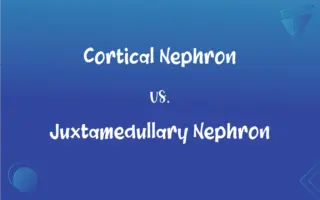Metoprolol Tartrate vs. Metoprolol Succinate: What's the Difference?
Edited by Aimie Carlson || By Janet White || Published on January 17, 2024
Metoprolol tartrate is a short-acting form of metoprolol used for treating high blood pressure and angina, while metoprolol succinate is an extended-release form used for the same conditions but with prolonged effect.

Key Differences
Metoprolol tartrate is an immediate-release formulation of metoprolol, leading to a quick onset of action but a shorter duration of effect. It typically requires multiple doses throughout the day. Metoprolol succinate, in contrast, is an extended-release version, slowly releasing the medication over time for a long-lasting effect, usually taken once daily.
Metoprolol tartrate is often prescribed in higher frequencies due to its shorter action duration, usually taken more than once per day. Metoprolol succinate's extended-release property allows for once-daily dosing, making it more convenient for long-term management of conditions.
Both are used to treat high blood pressure and angina, metoprolol tartrate is often preferred in situations requiring rapid control of symptoms. Metoprolol succinate is used for long-term treatment of these conditions and is also commonly prescribed for heart failure management.
The pharmacokinetic profile of metoprolol tartrate shows a quicker peak plasma concentration, while metoprolol succinate maintains a steadier concentration in the blood over a longer period, minimizing the risk of side effects associated with peak dosing.
The need for multiple daily doses of metoprolol tartrate can affect patient compliance, while metoprolol succinate's once-daily dosing is often more convenient. Also, the extended-release nature of metoprolol succinate may reduce the intensity of side effects compared to the immediate-release tartrate form.
ADVERTISEMENT
Comparison Chart
Release Mechanism
Immediate-release.
Extended-release.
Dosage Frequency
Multiple times per day.
Once daily.
Indications
Rapid symptom control for hypertension, angina.
Long-term treatment of hypertension, heart failure.
Pharmacokinetics
Quick peak plasma concentration.
Steady concentration, prolonged effect.
Patient Compliance and Side Effects
Less convenient due to frequent dosing.
More convenient, potentially fewer side effects.
ADVERTISEMENT
Metoprolol Tartrate and Metoprolol Succinate Definitions
Metoprolol Tartrate
Metoprolol tartrate acts quickly but has a shorter effect.
Metoprolol tartrate provided rapid control of his heart rate.
Metoprolol Succinate
Metoprolol succinate is taken once daily for convenience.
The once-daily dosing of metoprolol succinate improved his compliance.
Metoprolol Tartrate
Metoprolol tartrate is used for immediate relief from angina.
Metoprolol tartrate effectively managed her angina symptoms.
Metoprolol Succinate
Metoprolol succinate maintains steady blood pressure control.
Her blood pressure remained stable with metoprolol succinate.
Metoprolol Tartrate
Metoprolol tartrate requires multiple daily doses.
He took metoprolol tartrate three times a day as directed.
Metoprolol Succinate
Metoprolol succinate is an extended-release form for heart failure.
Metoprolol succinate was part of his long-term heart failure treatment plan.
Metoprolol Tartrate
Metoprolol tartrate is a short-acting beta-blocker for hypertension.
The doctor prescribed metoprolol tartrate for his high blood pressure.
Metoprolol Succinate
Metoprolol succinate releases medication gradually.
Metoprolol succinate’s gradual release minimized side effects.
Metoprolol Tartrate
Metoprolol tartrate is ideal for short-term symptom management.
For acute episodes, metoprolol tartrate was the preferred medication.
Metoprolol Succinate
Metoprolol succinate is suitable for long-term therapy.
For chronic management, her doctor recommended metoprolol succinate.
FAQs
How often is metoprolol tartrate taken?
It's typically taken multiple times per day.
Is metoprolol tartrate fast-acting?
Yes, it acts quickly but for a shorter duration.
What is metoprolol tartrate?
A short-acting beta-blocker used for hypertension and angina.
What is metoprolol succinate?
An extended-release form of metoprolol for long-term heart condition management.
Is metoprolol succinate good for chronic conditions?
Yes, especially for long-term heart condition management.
Does metoprolol succinate have a steady release?
Yes, it gradually releases medication for a prolonged effect.
Can metoprolol tartrate be used for acute symptoms?
Yes, it's effective for rapid symptom control.
Are there differences in side effects between the two?
Metoprolol succinate may have fewer peak-related side effects due to its extended release.
What are the key benefits of metoprolol succinate?
Convenient dosing and steady medication release.
Is metoprolol tartrate suitable for heart failure?
It's not typically the first choice for heart failure, unlike succinate.
What conditions are treated with metoprolol tartrate?
High blood pressure and angina.
Can metoprolol succinate be taken once daily?
Yes, it's designed for once-daily dosing.
Can metoprolol tartrate affect heart rate?
Yes, it can quickly lower the heart rate.
Is metoprolol succinate better for long-term use?
Yes, due to its extended-release properties.
Can both forms be used for hypertension?
Yes, but the choice depends on the specific needs of the patient and doctor's recommendation.
Can metoprolol succinate improve patient compliance?
Yes, due to its once-daily dosing.
Can metoprolol succinate reduce hospitalizations for heart failure?
Yes, it can help in reducing hospitalizations when used as part of a treatment regimen.
Does metoprolol tartrate require strict dosing times?
Yes, it's important to adhere to prescribed dosing schedules.
Is metoprolol tartrate used in emergency situations?
It can be used for rapid control of certain acute symptoms.
Does metoprolol succinate have a risk of overdose?
As with any medication, taking more than the prescribed dose can be risky.
About Author
Written by
Janet WhiteJanet White has been an esteemed writer and blogger for Difference Wiki. Holding a Master's degree in Science and Medical Journalism from the prestigious Boston University, she has consistently demonstrated her expertise and passion for her field. When she's not immersed in her work, Janet relishes her time exercising, delving into a good book, and cherishing moments with friends and family.
Edited by
Aimie CarlsonAimie Carlson, holding a master's degree in English literature, is a fervent English language enthusiast. She lends her writing talents to Difference Wiki, a prominent website that specializes in comparisons, offering readers insightful analyses that both captivate and inform.







































































